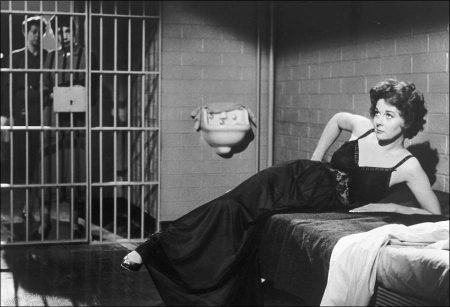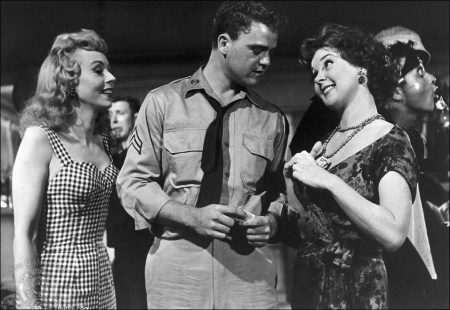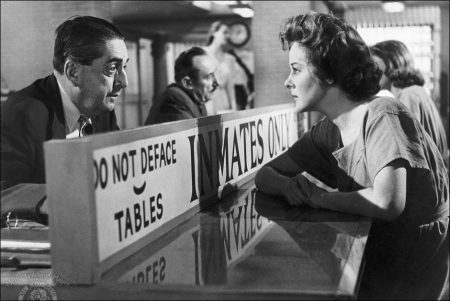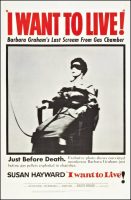Taglines: The murder trial that shook the world!
I Want to Live! movie synopsis. The riveting true story of brazen bad girl Barbara Graham, a perpetual offender who tries to go straight but is sent to death row after being implicated in a murder. When journalist Ed Montgomery, whose initial newspaper articles on Barbara’s crime played up her recklessness, becomes convinced that she may be innocent, he begins a desperate campaign to save her from the gas chamber.
I Want to Live! is a 1958 American biographical film noir directed by Robert Wise, and starring Susan Hayward, Simon Oakland, Virginia Vincent, and Theodore Bikel. It follows the life of Barbara Graham, a prostitute and habitual criminal who is convicted of murder and faces capital punishment.
The screenplay, written by Nelson Gidding and Don Mankiewicz, was adapted from personal letters written by Graham, in addition to newspaper articles written by Pulitzer Prize-winning journalist Ed Montgomery. The film presents a semi-fictionalized version of the case, indicating the possibility of innocence concerning Graham.
Released in late 1958, I Want to Live! was a commercial and critical success, garnering favorable reviews from critics for both Hayward’s performance as well as the film’s realistic depiction of capital punishment. The film earned a total of six Academy Award nominations, with Hayward winning a Best Actress Oscar at the 31st Academy Awards, as well as the Golden Globe Award in the same category.
Some sources state the film grossed $3.5 million, though in the Walter Wanger biography Walter Wanger, Hollywood Independent (2000), the film is stated to have grossed $5,641,711, with a net profit of $2,455,570. Star Hayward was entitled to 37% of the film’s overall profit.

About the Story
In 1950 San Francisco, petty criminal and prostitute Barbara Graham faces a misdemeanor charge for soliciting sex. She returns to her native San Diego, but is soon charged with perjury after she provides two criminal friends a false alibi. She subsequently returns to sex work and other criminal activities to make a living. She begins working for thief Emmett Perkins by luring men to his gambling parlor. Barbara manages to earn a significant amount of money, and quits working for Emmett to marry Hank, her third husband. The couple have a son, Bobby, but their marriage is turbulent due to Hank’s drug addiction, which leaves him jobless.
Barbara throws Hank out of her house, but is subsequently evicted. Desperate, she leaves Bobby in the care of her mother and returns to working for Emmett, who is now associated with thugs John Santo and Bruce King. Police eventually crack down on the operation, and Barbara surrenders. During the interrogation, however, she is stunned when authorities accuse her of helping Perkins and Santo murder Mabel Monahan, an elderly Burbank woman. Barbara insists she was home with her husband and son the night of the murder, but is indicted by a grand jury. Barbara’s childhood friend, Peg, visits her in jail, and agrees to help care for Bobby.
Attorney Richard Tibrow is assigned to Barbara’s case, and informs her that her alibi is meaningless unless Hank can corroborate it. Barbara foolishly accepts a phony alibi from Ben Miranda, a friend of her jail mate, Rita. Ben insists that Barbara admit she helped with the murder before agreeing to provide the alibi, and she reluctantly implicates herself. During the trial,
Hank refutes Barbara’s alibi, and a taped recording of her confession, made by Ben during their meeting, is used as evidence against her. Barbara insists that she sought the phony alibi only to avoid the death penalty, and that her admission is false. She is ultimately convicted, along with Emmett and John; all three are sentenced to death.
I Want to Live! (1958)
Directed by: Robert Wise
Starring: Susan Hayward, Simon Oakland, Virginia Vincent, Theodore Bikel, Wesley Lau, Philip Coolidge, Lou Krugman, James Philbrook, Bartlett Robinson, Gage Clarke, Alice Backes, Gertrude Flynn
Screenplay by: Nelson Gidding, Don Mankiewicz
Cinematography by: Lionel Lindon
Film Editing by: William Hornbeck
Set Decoration by: Victor A. Gangelin, Ted Haworth
Music by: Johnny Mandel
MPAA Rating: Itıdç
Distributed by: United Artists
Release Date: October 29, 1958
Views: 215


